1
Do you train for passing tests or do you train for creative inquiry?Noam Chomsky
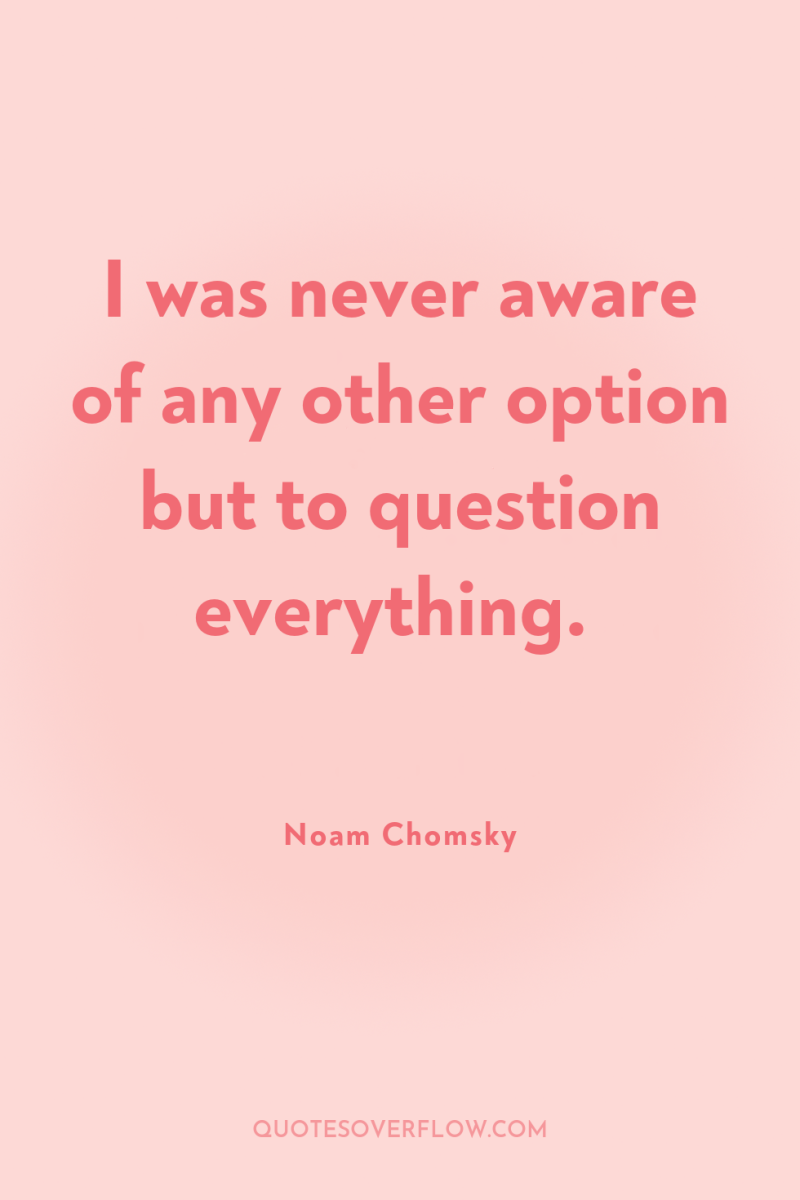
2
I was never aware of any other option but to question everything.Noam Chomsky
3
The only debatable issue, it seems to me, is whether it is more ridiculous to turn to experts in social theory for general well-confirmed propositions, or to the specialists in the great religions and philosophical systems for insights into fundamental human values.Noam Chomsky
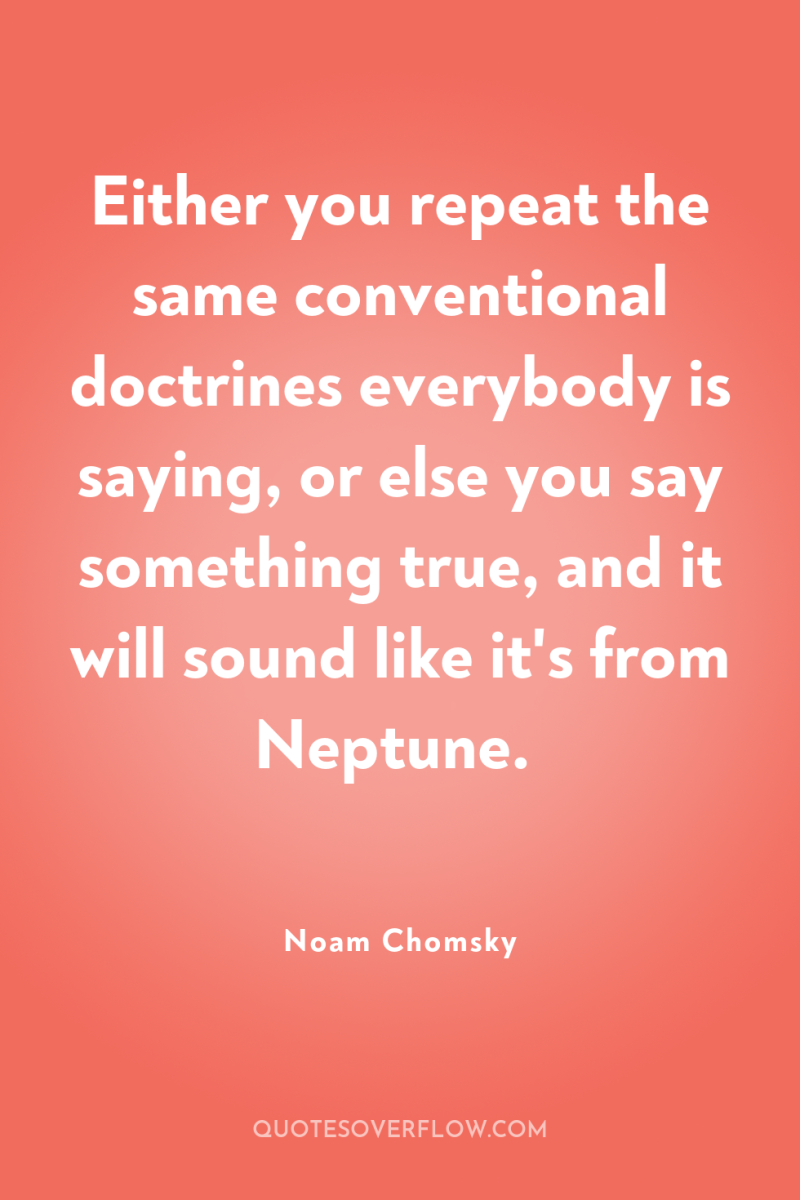
4
Either you repeat the same conventional doctrines everybody is saying, or else you say something true, and it will sound like it's from Neptune.Noam Chomsky
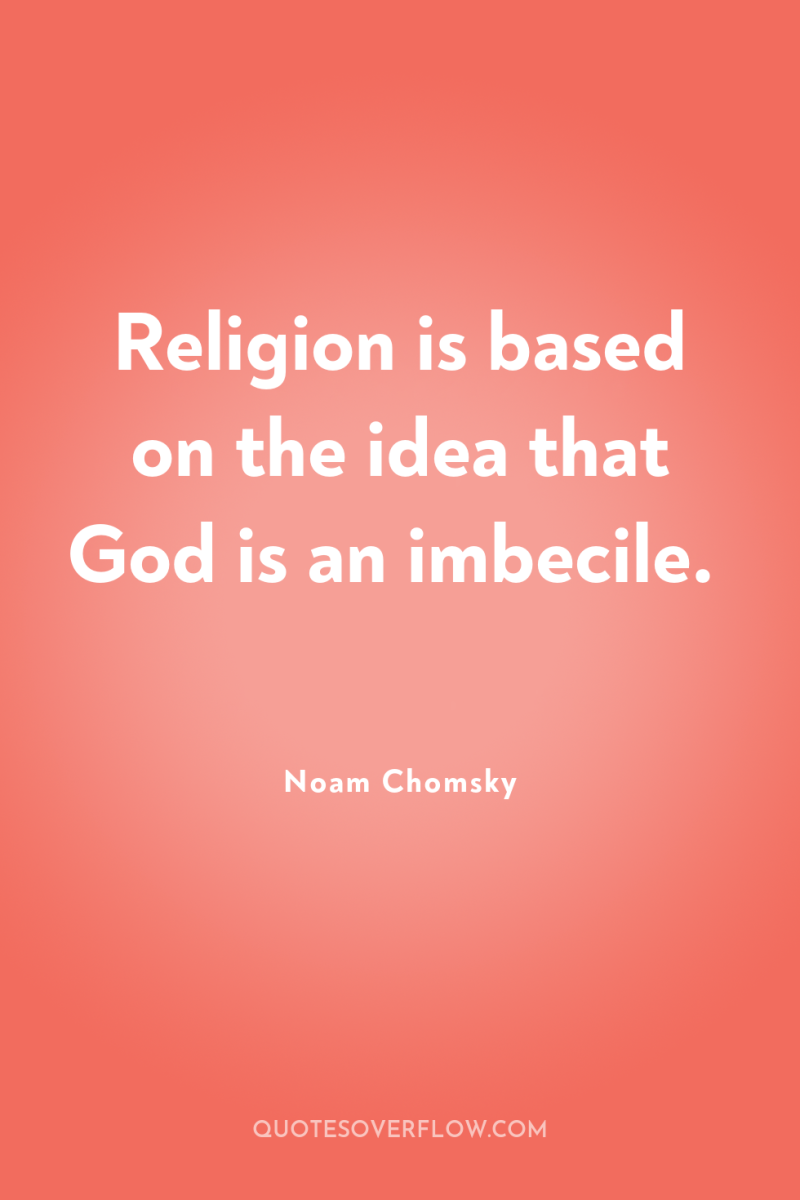
5
Religion is based on the idea that God is an imbecile.Noam Chomsky
6
Destroying hope is a critically important project. And when it is achieved, formal democracy is allowed–even preferred, if only for public relation purposes. In more honest circles, much of this is conceded. Of course, it is understood much more profoundly by beasts in men's shapes who endure the consequences of challenging the imperatives of stability and order.Noam Chomsky
7
Since Jimmy Carter, religious fundamentalists play a major role in elections. He was the first president who made a point of exhibiting himself as a born again Christian. That sparked a little light in the minds of political campaign managers: Pretend to be a religious fanatic and you can pick up a third of the vote right away. Nobody asked whether Lyndon Johnson went to church every day. Bill Clinton is probably about as religious as I am, meaning zero, but his managers made a point of making sure that every Sunday morning he was in the Baptist church singing hymns.Noam Chomsky
8
The whole educational and professional training system is a very elaborate filter, which just weeds out people who are too independent, and who think for themselves, and who don't know how to be submissive, and so on -- because they're dysfunctional to the institutions.Noam Chomsky
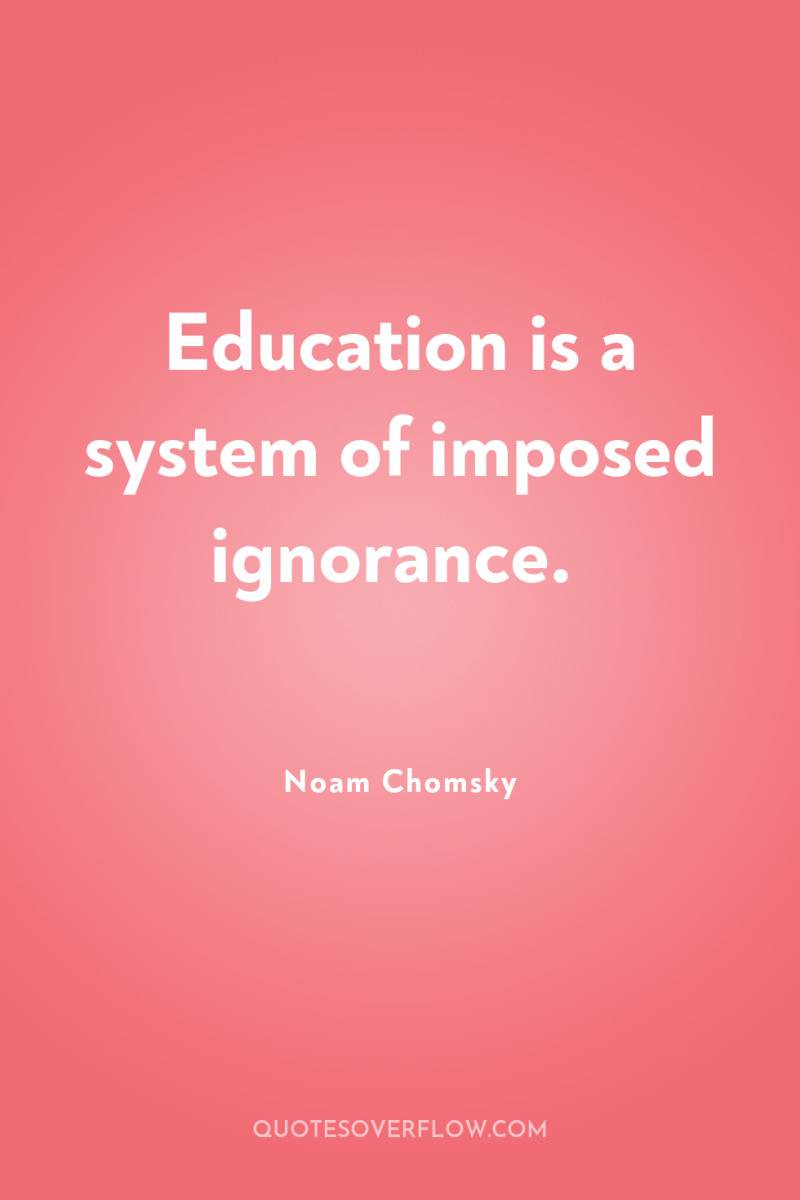
9
Education is a system of imposed ignorance.Noam Chomsky
10
Most problems of teaching are not problems of growth but helping cultivate growth. As far as I know, and this is only from personal experience in teaching, I think about ninety percent of the problem in teaching, or maybe ninety-eight percent, is just to help the students get interested. Or what it usually amounts to is to not prevent them from being interested. Typically they come in interested, and the process of education is a way of driving that defect out of their minds. But if children['s]. . normal interest is maintained or even aroused, they can do all kinds of things in ways we don't understand.Noam Chomsky
11
The other day I happened to be reading a careful, interesting account of the state of British higher education. The government is a kind of market-oriented government and they came out with an official paper, a ‘White Paper’ saying that it is not the responsibility of the state to support any institution that can’t survive in the market. So, if Oxford is teaching philosophy, the arts, Greek history, medieval history, and so on, and they can’t sell it on the market, why should they be supported? Because life consists only of what you can sell in the market and get back, nothing else. That is a real pathology. .Noam Chomsky
12
Most schooling is training for stupidity and conformity, and that's institutional, but occasionally you get a spark, somebody'll challenge your mind, make you think and so on, and that has a tremendous effect you just reach all sorts of people. Of course if you do it you may very have problems, you have to tread the narrow line. There are plenty of people who don't want students to think, they're afraid of the crisis of democracy. If people start thinking you get all these problems that I quoted before. They won't have enough humility to submit to a civil rule or they'll start trying to press their demands in the political arena and have ideas of their own, instead of beleiving what they're told. And privelage and power typically doesn't want that and so they react and the high school teacher that tries to get students to think may find oppression, firing and so on.Noam Chomsky
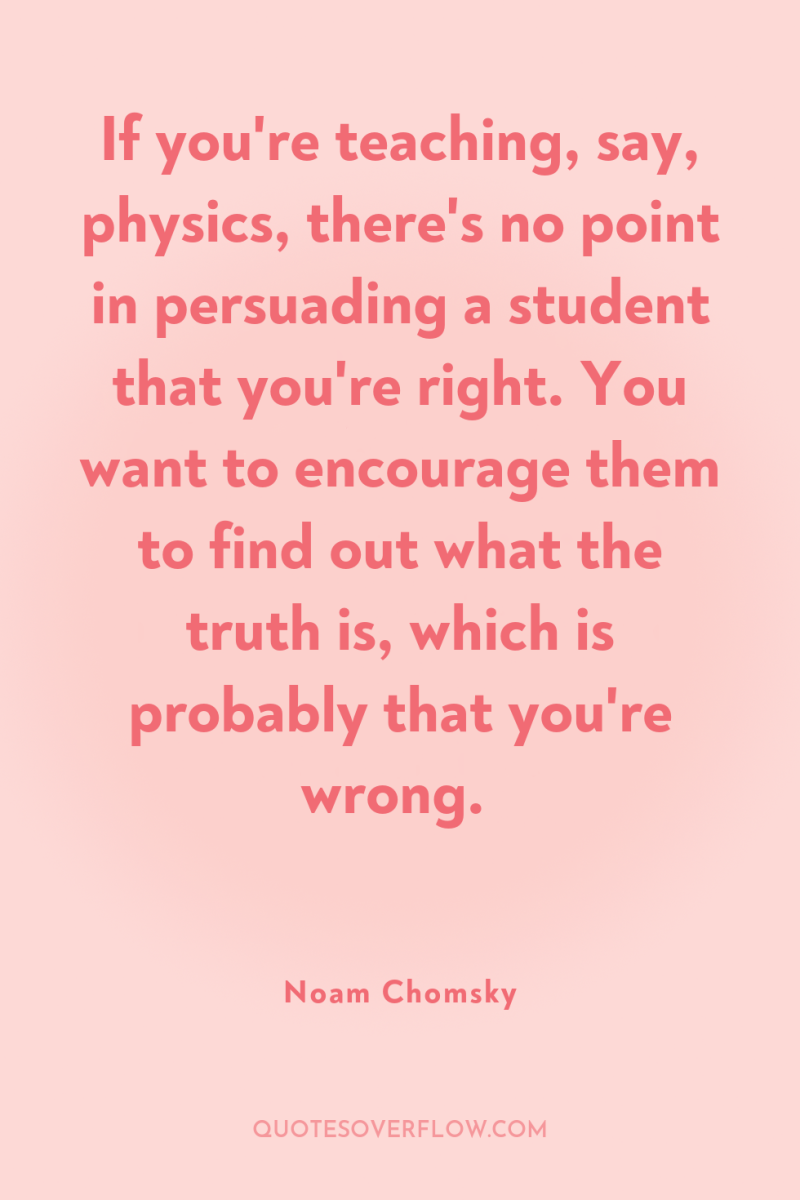
13
If you're teaching, say, physics, there's no point in persuading a student that you're right. You want to encourage them to find out what the truth is, which is probably that you're wrong.Noam Chomsky
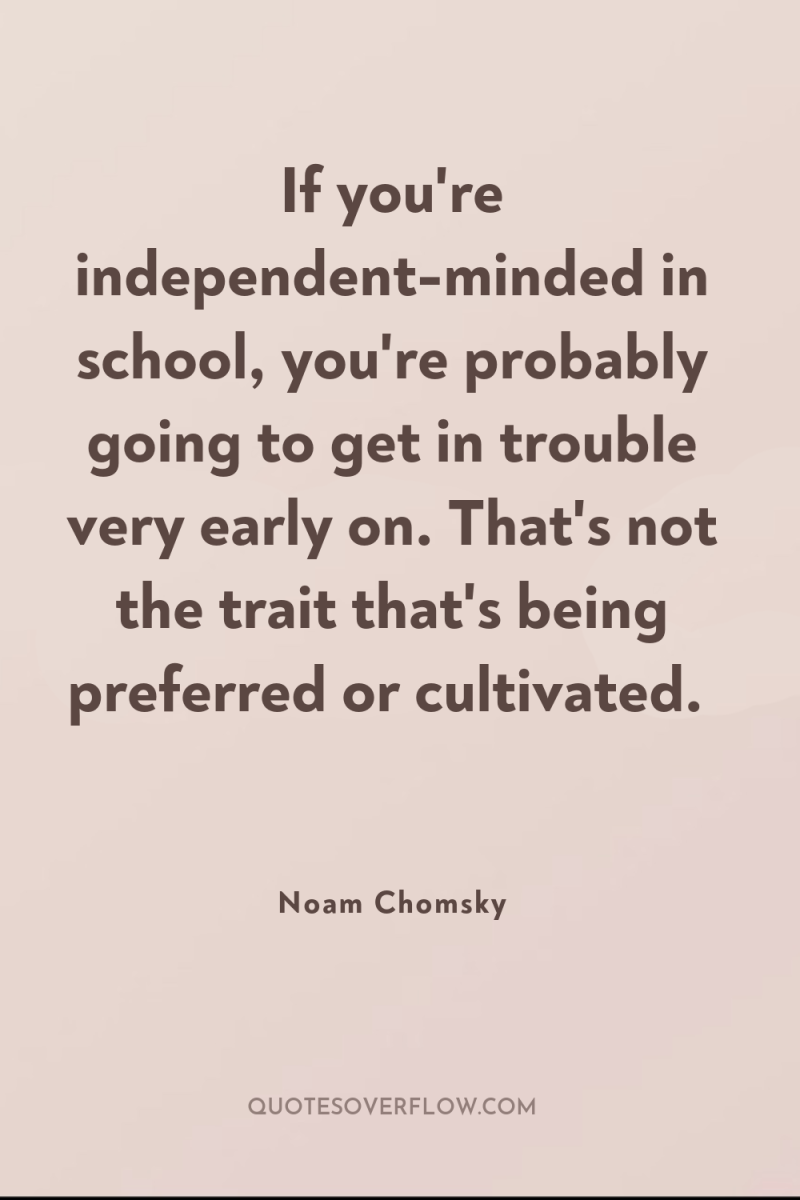
14
If you're independent-minded in school, you're probably going to get in trouble very early on. That's not the trait that's being preferred or cultivated.Noam Chomsky
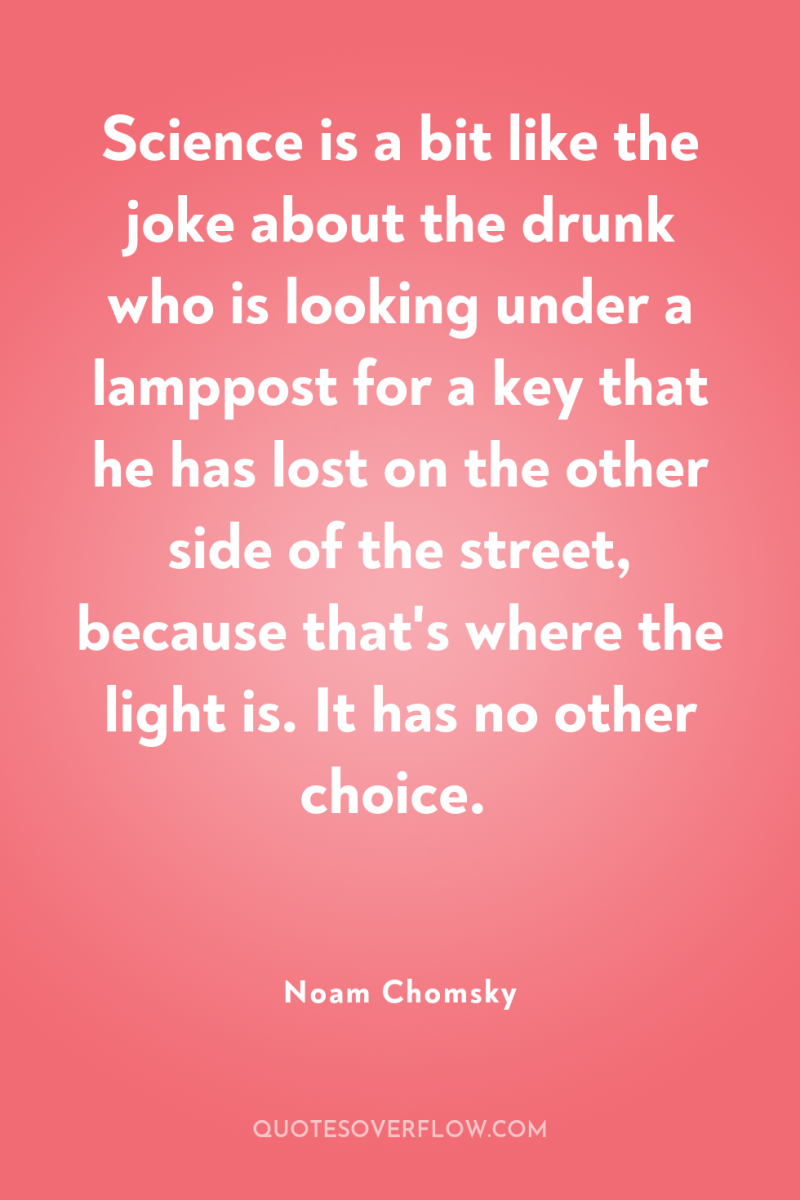
15
Science is a bit like the joke about the drunk who is looking under a lamppost for a key that he has lost on the other side of the street, because that's where the light is. It has no other choice.Noam Chomsky
16
In mathematics, in physics, people are concerned with what you say, not with your certification. But in order to speak about social reality, you must have the proper credentials, particularly if you depart from the accepted framework of thinking. Generally speaking, it seems fair to say that the richer the intellectual substance of a field, the less there is a concern for credentials, and the greater is concern for content.Noam Chomsky
17
One of the difficulties in raising public concern over the very severe threats of global warming is that 40 percent of the US population does not see why it is a problem, since Christ is returning in a few decades. About the same percentage believe that the world was created a few thousand years ago. If science conflicts with the Bible, so much the worse for science. It would be hard to find an analogue in other societies. .Noam Chomsky
18
That's the whole point of good propaganda. You want to create a slogan that nobody's going to be against, and everybody's going to be for. Nobody knows what it means, because it doesn't mean anything.Noam Chomsky
19
Respectable opinion would never consider an assessment of the Reagan Doctrine or earlier exercises in terms of their actual human costs, and could not comprehend that such an assessment–which would yield a monstrous toll if accurately conducted on a global scale–might perhaps be a proper task in the United States. At the same level of integrity, disciplined Soviet intellectuals are horrified over real or alleged American crimes, but perceive their own only as benevolent intent gone awry, or errors of an earlier day, now overcome; the comparison is inexact and unfair, since Soviet intellectuals can plead fear as an excuse for their services to state violence.Noam Chomsky
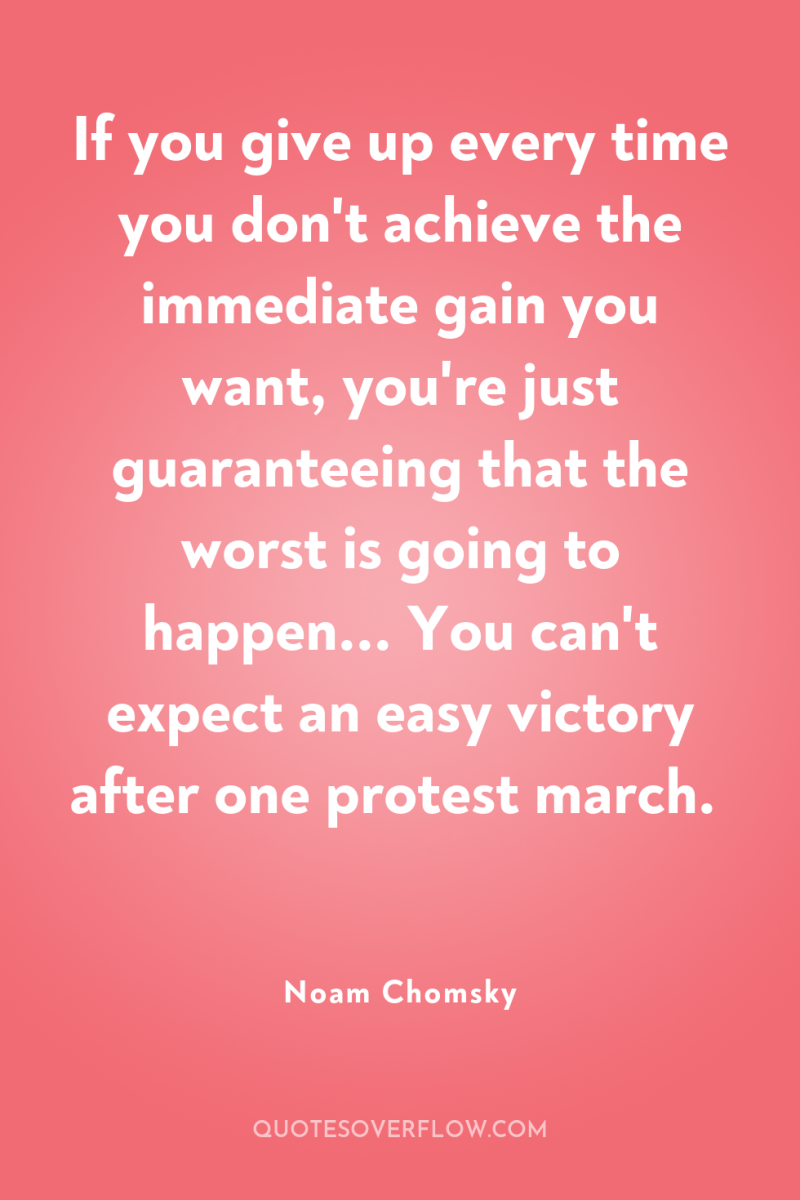
20
If you give up every time you don't achieve the immediate gain you want, you're just guaranteeing that the worst is going to happen... You can't expect an easy victory after one protest march.Noam Chomsky
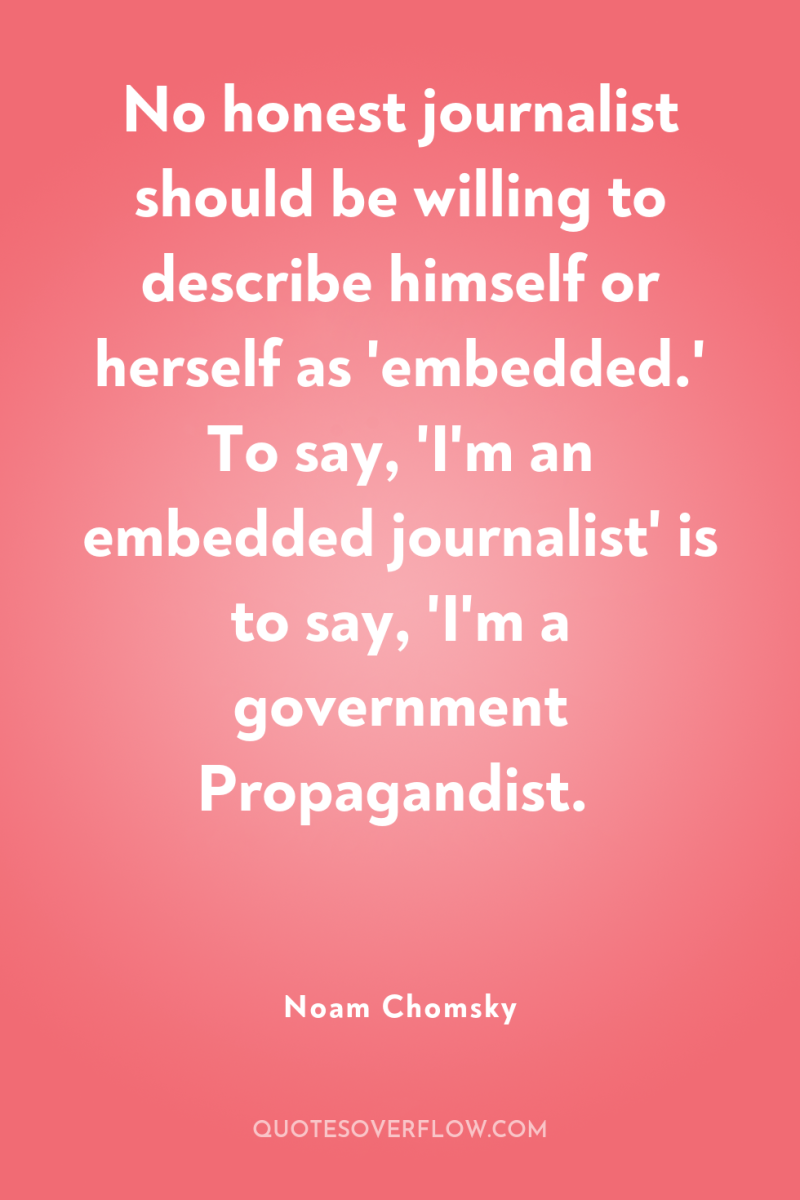
21
No honest journalist should be willing to describe himself or herself as 'embedded.' To say, 'I'm an embedded journalist' is to say, 'I'm a government Propagandist.Noam Chomsky
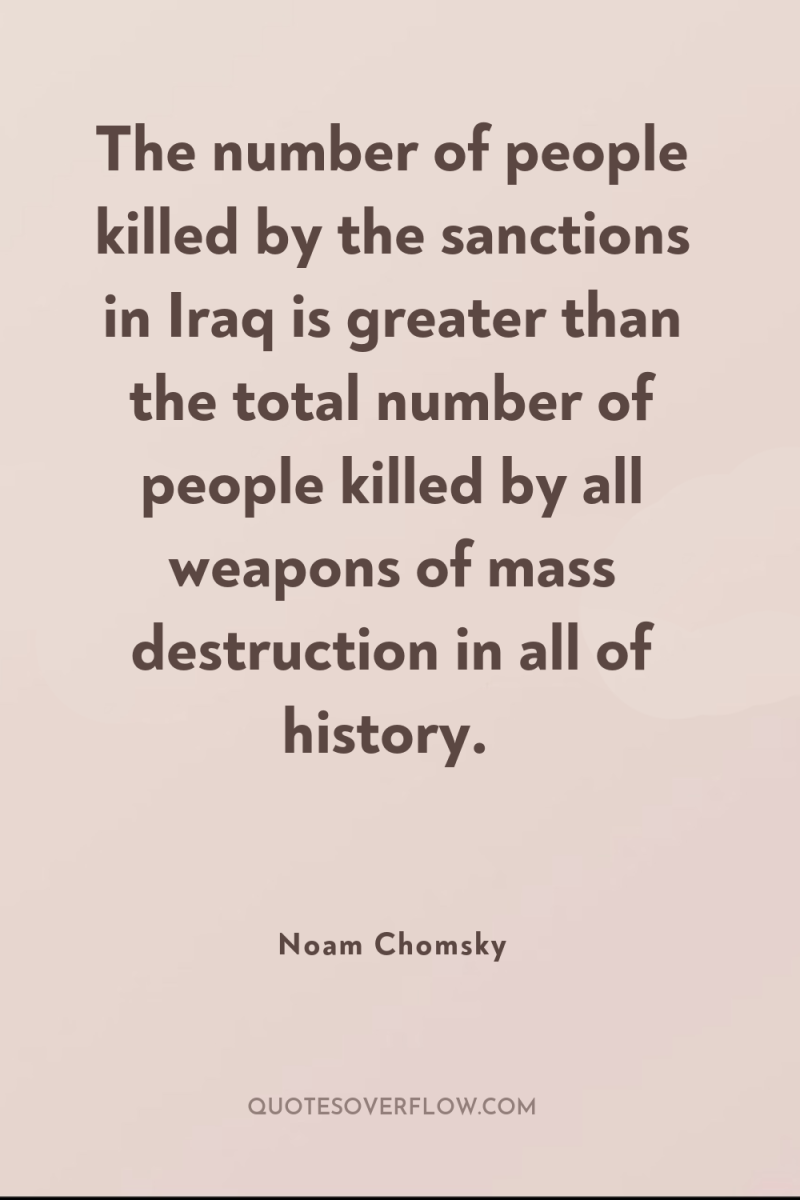
22
The number of people killed by the sanctions in Iraq is greater than the total number of people killed by all weapons of mass destruction in all of history.Noam Chomsky
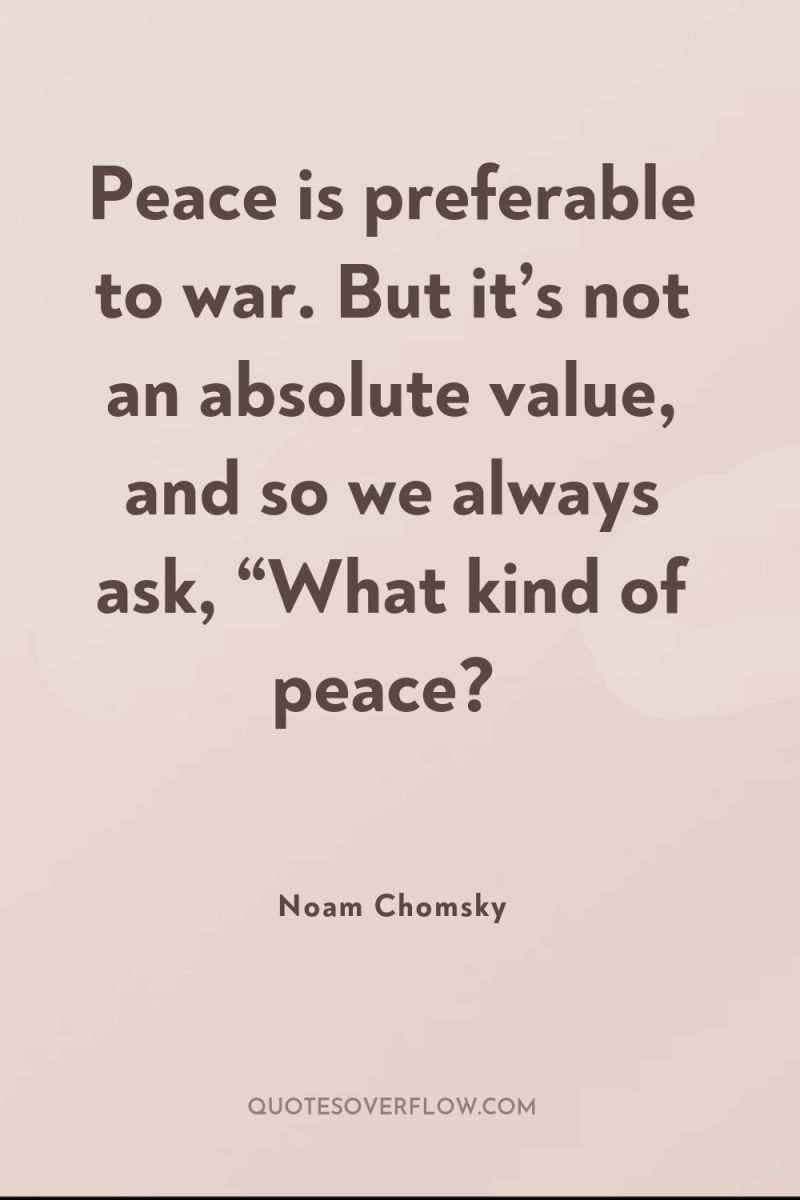
23
Peace is preferable to war. But it’s not an absolute value, and so we always ask, “What kind of peace?Noam Chomsky
24
I am not a committed pacifist. I would not hold that it is under all imaginable circumstances wrong to use violence, even though use of violence is in some sense unjust. I believe that one has to estimate relative justices. But the use of violence and the creation of some degree of injustice can only be justified on the basis of the claim and the assessment-which always ought to be undertaken very, very seriously and with a good deal of scepticism that this violence is being exercised because a more just result is going to be achieved. .Noam Chomsky
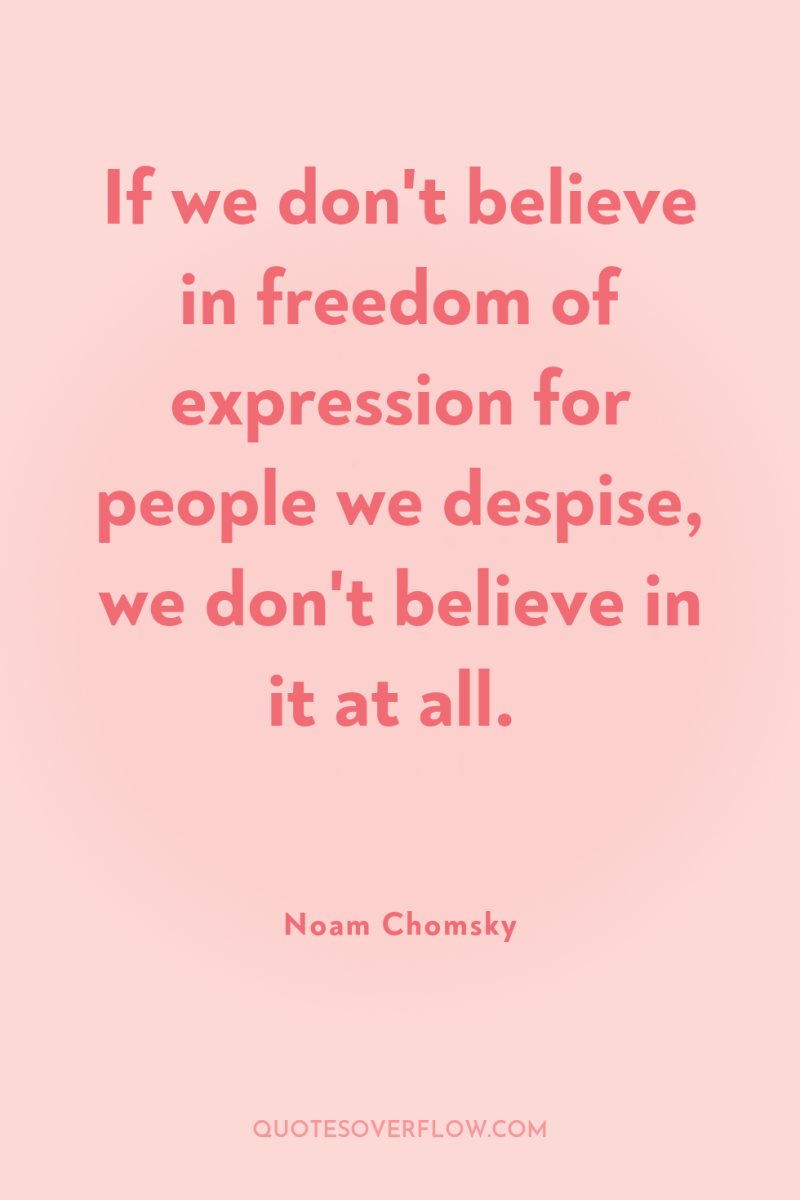
25
If we don't believe in freedom of expression for people we despise, we don't believe in it at all.Noam Chomsky
26
I think it only makes sense to seek out and identify structures of authority, hierarchy, and domination in every aspect of life, and to challenge them; unless a justification for them can be given, they are illegitimate, and should be dismantled, to increase the scope of human freedom.Noam Chomsky
27
Responsibility I believe accrues through privilege. People like you and me have an unbelievable amount of privilege and therefore we have a huge amount of responsibility. We live in free societies where we are not afraid of the police; we have extraordinary wealth available to us by global standards. If you have those things, then you have the kind of responsibility that a person does not have if he or she is slaving seventy hours a week to put food on the table; a responsibility at the very least to inform yourself about power. Beyond that, it is a question of whether you believe in moral certainties or not.Noam Chomsky
28
In accordance with the prevailing conceptions in the U.S., there is no infringement on democracy if a few corporations control the information system: in fact, that is the essence of democracy. In the Annals of the American Academy of Political and Social Science, the leading figure of the public relations industry, Edward Bernays, explains that “the very essence of the democratic process” is “the freedom to persuade and suggest, ” what he calls “the engineering of consent.” “A leader, ” he continues, “frequently cannot wait for the people to arrive at even general understanding … Democratic leaders must play their part in … engineering … consent to socially constructive goals and values, ” applying “scientific principles and tried practices to the task of getting people to support ideas and programs”; and although it remains unsaid, it is evident enough that those who control resources will be in a position to judge what is “socially constructive, ” to engineer consent through the media, and to implement policy through the mechanisms of the state. If the freedom to persuade happens to be concentrated in a few hands, we must recognize that such is the nature of a free society.Noam Chomsky
29
At its root, the logic is that of the Grand Inquisitor, who bitterly assailed Christ for offering people freedom and thus condemning them to misery. The Church must correct the evil work of Christ by offering the miserable mass of humanity the gift they most desire and need: absolute submission. It must “vanquish freedom” so as “to make men happy” and provide the total “community of worship” that they avidly seek. In the modern secular age, this means worship of the state religion, which in the Western democracies incorporates the doctrine of submission to the masters of the system of public subsidy, private profit, called free enterprise. The people must be kept in ignorance, reduced to jingoist incantations, for their own good. And like the Grand Inquisitor, who employs the forces of miracle, mystery, and authority “to conquer and hold captive for ever the conscience of these impotent rebels for their happiness” and to deny them the freedom of choice they so fear and despise, so the “cool observers” must create the “necessary illusions” and “emotionally potent oversimplifications” that keep the ignorant and stupid masses disciplined and content.Noam Chomsky
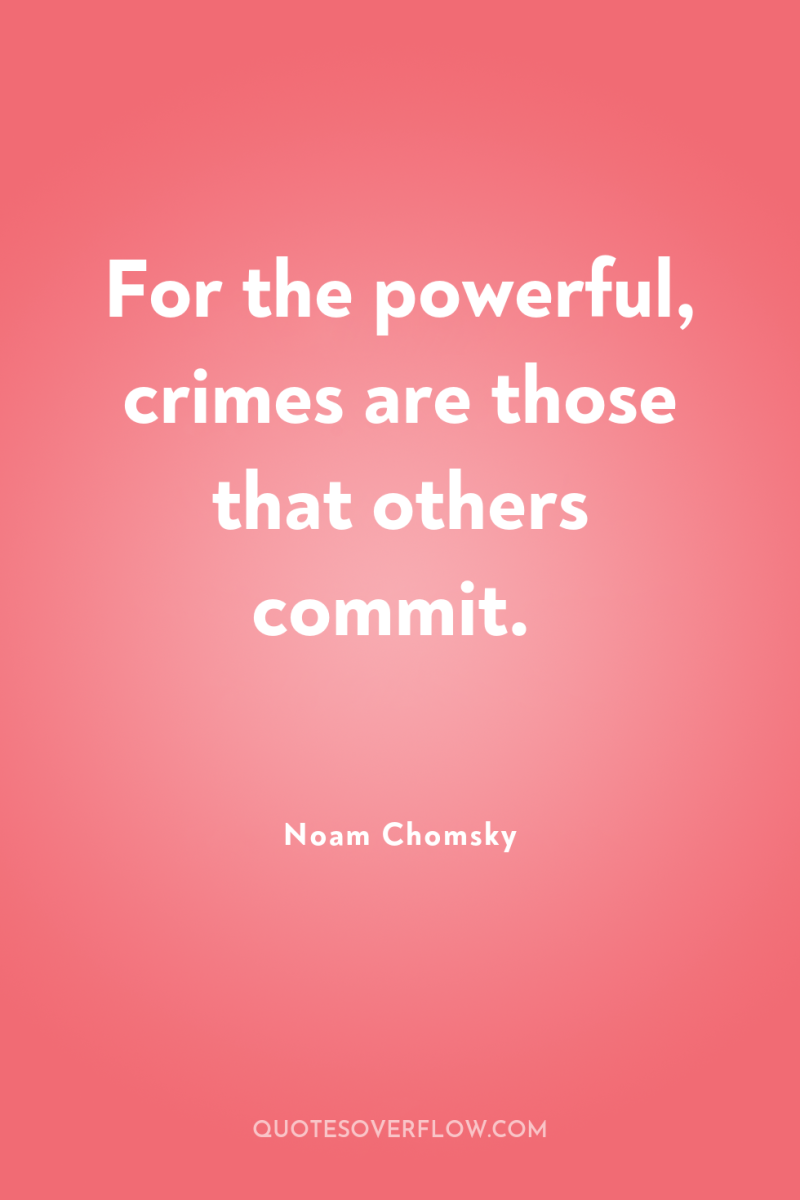
30
For the powerful, crimes are those that others commit.Noam Chomsky
31
That is what I have always understood to be the essence of anarchism: the conviction that the burden of proof has to be placed on authority, and that it should be dismantled if that burden cannot be met.Noam Chomsky
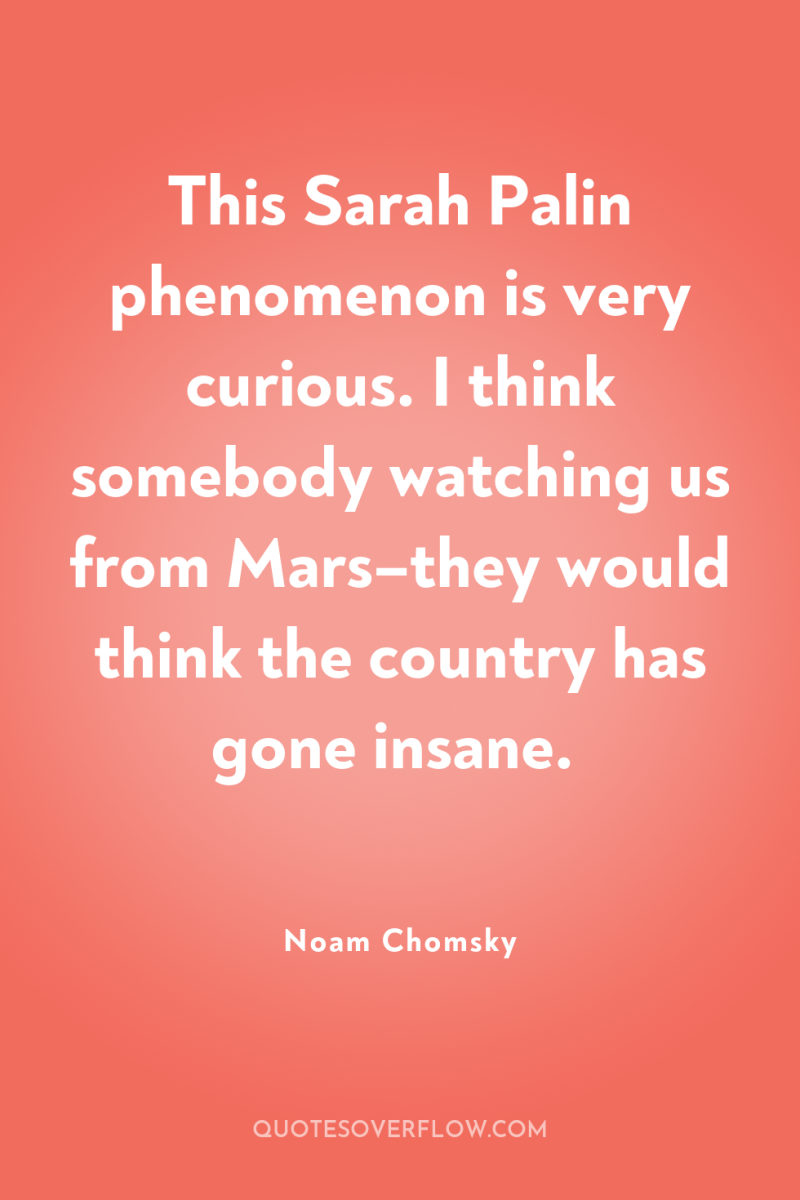
32
This Sarah Palin phenomenon is very curious. I think somebody watching us from Mars–they would think the country has gone insane.Noam Chomsky

33
People who call themselves supporters of Israel are actually supporters of its moral degeneration and ultimate destruction.Noam Chomsky
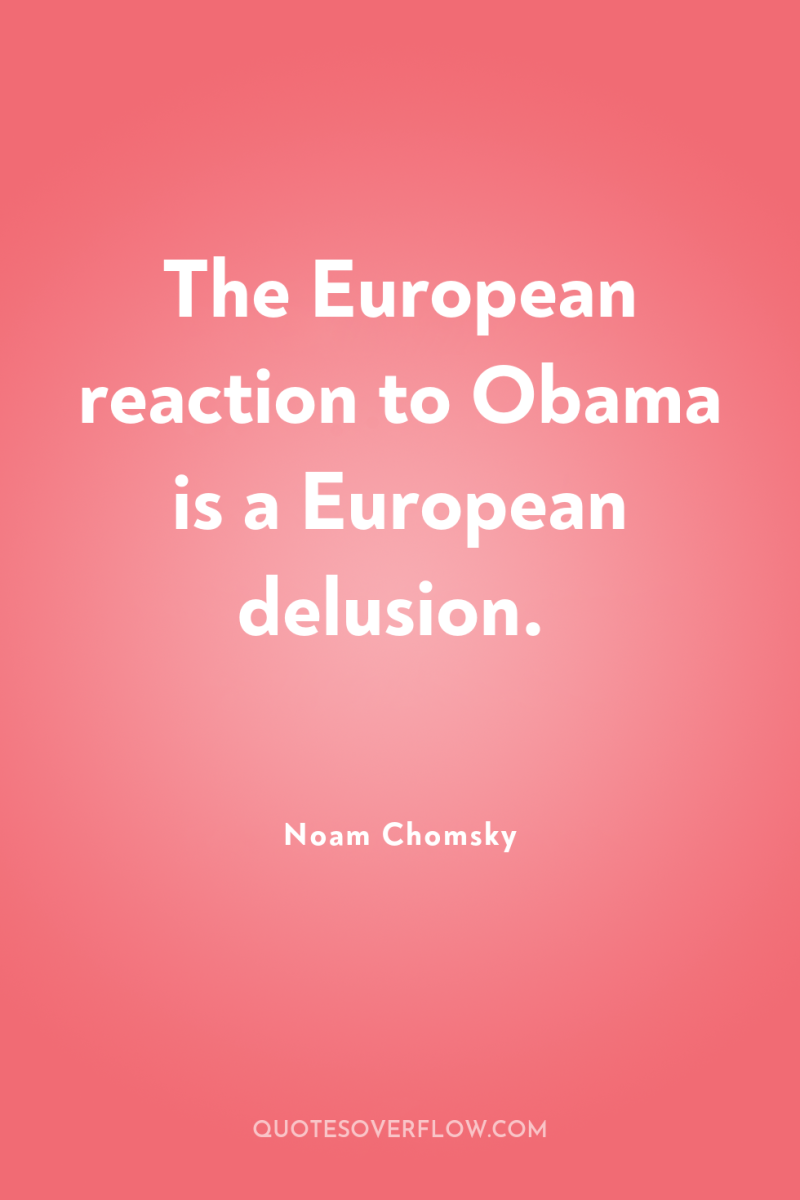
34
The European reaction to Obama is a European delusion.Noam Chomsky
35
Israel's demonstration of its military prowess in 1967 confirmed its status as a 'strategic asset, ' as did its moves to prevent Syrian intervention in Jordan in 1970 in support of the PLO. Under the Nixon doctrine, Israel and Iran were to be 'the guardians of the Gulf, ' and after the fall of the Shah, Israel's perceived role was enhanced. Meanwhile, Israel has provided subsidiary services elsewhere, including Latin America, where direct US support for the most murderous regimes has been impeded by Congress. While there has been internal debate and some fluctuation in US policy, much exaggerated in discussion here, it has been generally true that US support for Israel's militarization and expansion reflected the estimate of its power in the region. The effect has been to turn Israel into a militarized state completely dependent on US aid, willing to undertake tasks that few can endure, such as participation in Guatemalan genocide. For Israel, this is a moral disaster and will eventually become a physical disaster as well. For the Palestinians and many others, it has been a catastrophe, as it may sooner or later be for the entire world, with the growing danger of superpower confrontation. .Noam Chomsky
36
There are few genuine conservatives within the U.S. political system, and it is a sign of the intellectual corruption of the age that the honorable term 'conservatism' can be appropriated to disguise the advocacy of a powerful, lawless, aggressive and violent state, a welfare state for the rich dedicated to a lunatic form of Keynesian economic intervention that enhances state and private power while mortgaging the country's future.Noam Chomsky
37
In fact quite generally, commercial advertising is fundamentally an effort to undermine markets. We should recognize that. If you’ve taken an economics course, you know that markets are supposed to be based on informed consumers making rational choices. You take a look at the first ad you see on television and ask yourself … is that it’s purpose? No it’s not. It’s to create uninformed consumers making irrational choices. And these same institutions run political campaigns. It’s pretty much the same: you have to undermine democracy by trying to get uninformed people to make irrational choices. .Noam Chomsky
38
Both political parties have moved to the right during the neoliberal period. Today’s New Democrats are pretty much what used to be called “moderate Republicans.” The “political revolution” that Bernie Sanders called for, rightly, would not have greatly surprised Dwight Eisenhower.The fate of the minimum wage illustrates what has been happening. Through the periods of high and egalitarian growth in the ‘50s and ‘60s, the minimum wage–which sets a floor for other wages–tracked productivity. That ended with the onset of neoliberal doctrine. Since then, the minimum wage has stagnated (in real value). Had it continued as before, it would probably be close to $20 per hour. Today, it is considered a political revolution to raise it to $15. .Noam Chomsky
39
The debt is being cynically exploited by the far right, with collusion of the Democrat establishment, to undermine what remains of social programs, public education, unions, and, in general, remaining barriers to corporate tyranny.Noam Chomsky
40
They declare that it is unpatriotic and disruptive to question the workings of authority--but patriotic to institute harsh and regressive policies that benefit the wealthy, undermine social programs that serve the needs of the great majority, and subordinate a frightened population to increased state control.Noam Chomsky
41
Moynihan, when he was ambassador to the United Nations, produced the same effect when he attacked the Third World. These attacks aroused great admiration here; for example, when he denounced Idi Amin of Uganda as a "racist murderer." The question is not whether Idi Amin is a racist murderer. No doubt the appellation is correct. The question is, what does it mean for Moynihan to make this accusation and for others to applaud his honesty and courage in doing so? Who is Moynihan? He served in four administrations, those of Kennedy, Johnson, Nixon, and Ford - that is to say, administrations that were guilty of racist murder on a scale undreamed of by Idi Amin. Imagine that some minor functionary of the Third Reich had correctly accused someone of being a racist murderer.Noam Chomsky
42
The liberal press cannot question the basic doctrine of the state religion, that the United States is benevolent, even though often misguided in its innocence, that it labors to permit free choice, even though at times some mistakes are committed in the exuberance of its programs of international goodwill. We must believe that we "Americans" are always good, though, to be sure, fallible.Noam Chomsky
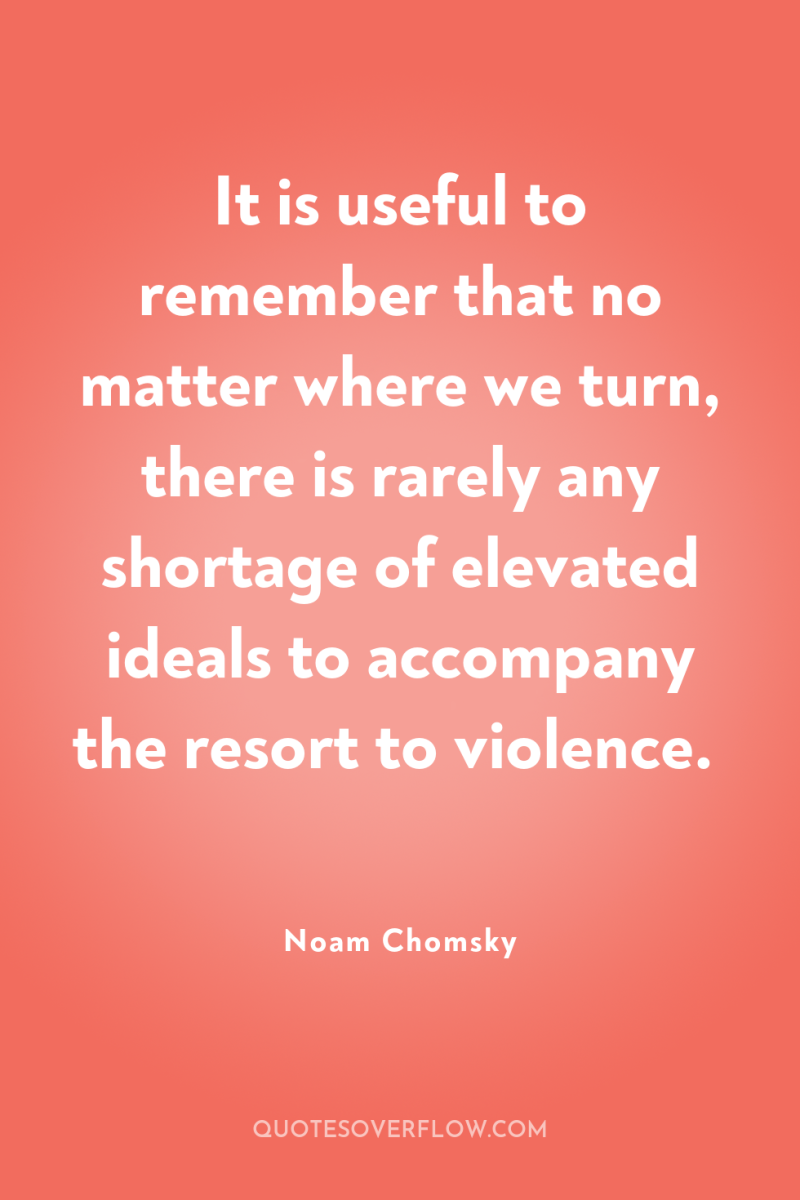
43
It is useful to remember that no matter where we turn, there is rarely any shortage of elevated ideals to accompany the resort to violence.Noam Chomsky
44
Over the last 25 years, the major popular movements that have had significant impact on the general society and have changed it, that have had a major civilizing effect — the feminist movement, the environmental movement, and so on — these are mostly developments of the ‘70s and ‘80s. Their roots might be in the activism of the ‘60s, but the movements themselves developed and extended later. The same is true of the changes in respect for other cultures, rights of oppressed people, and so on. These are quite significant changes. If you compare the United States now to what it was, say, 35 years ago, the changes are quite dramatic. These are changes in popular consciousness that are quite deeply embedded.Noam Chomsky
45
You aren't supposed to learn that dedicated, committed effort can bring about significant changes of consciousness and understanding. That's a very dangerous idea, and therefore it's been wiped out of history.Noam Chomsky
46
The idea that you have to avoid teaching evolution or pretend you're not teaching it is unique in the industrial world. And the statistics are mind-boggling. Roughly half the population think the world was created a couple thousand years ago.Noam Chomsky
47
It is quite possible--overwhelmingly probable, one might guess--that we will always learn more about human life and personality from novels than from scientific psychologyNoam Chomsky
48
Thinking is a human feature. Will AI someday really think? That's like asking if submarines swim. If you call it swimming then robots will think, yes.Noam Chomsky
49
The two main criminals are France and the United States. They owe Haiti enormous reparations because of actions going back hundreds of years. If we could ever get to the stage where somebody could say, 'We're sorry we did it, ' that would be nice. But if that just assuages guilt, it's just another crime. To become minimally civilized, we would have to say, 'We carried out and benefited from vicious crimes. A large part of the wealth of France comes from the crimes we committed against Haiti, and the United States gained as well. Therefore we are going to pay reparations to the Haitian people.' Then you will see the beginnings of civilization. .Noam Chomsky
50
Small differences in a system of great power can have enormous consequences. [Source: Al Jazeera 'Upfront' interview]Noam Chomsky
51
I think maybe the classic formulation was by David Hume in "Of the First Principles of Government, " where he pointed out that "Force is always on the side of the governed." Whether it's a military society, a partially free society, or what we - not he - would call a totalitarian state, it's the governed who have the power. And the rulers have to find ways to keep them from using their power. Force has its limits, so they have to use persuasion. They have to somehow find ways to convince people to accept authority. If they aren't able to do that, the whole thing is going to collapse.Noam Chomsky
52
Look, part of the whole technique of disempowering people is to make sure that the real agents of change fall out of history, and are never recognized in the culture for what they are. So it's necessary to distort history and make it look as if Great Men did everything - that's part of how you teach people they can't do anything, they're helpless, they just have to wait for some Great Man to come along and do it for them.Noam Chomsky
53
The missile crisis "was the most dangerous moment in human history, " Arthur Schlesinger commented in October 2002 at a conference in Havana on the fortieth anniversary of the crisis, attended by a number of those who witnessed it from within as it unfolded. Desision-makers at the time undoubtedly understood that the fate of the world was in their hands. Nevertheless, attendees at the conference may have been shocked by some of the revelations. They were informed that in October 1962 the world was "one word away" from nuclear war. "A guy named Arkhipov saved the world, " said Thomas Blanton of the National Security Archive in Washington, which helped organize the event. He was referring to Vasil Arkhipov, a Soviet submarine officer blocked an order to fire nuclear-armed toredoes in October 27, at the tensest moment of the crisis, when te submarines were under attack bu US destroyers, A devastating response would have been a near certainty, leading a major war. Pg 74, Penguin Publication.Noam Chomsky
54
The smart way to keep people passive and obedient is to strictly limit the spectrum of acceptable opinion, but allow very lively debate within that spectrum–even encourage the more critical and dissident views. That gives people the sense that there’s free thinking going on, while all the time the presuppositions of the system are being reinforced by the limits put on the range of the debate.Noam Chomsky
55
It’s ridiculous to talk about freedom in a society dominated by huge corporations. What kind of freedom is there inside a corporation? They’re totalitarian institutions - you take orders from above and maybe give them to people below you. There’s about as much freedom as under Stalinism.Noam Chomsky
56
Optimism is a strategy for making a better future. Because unless you believe that the future can be better, you are unlikely to step up and take responsibility for making it so.Noam Chomsky
57
...if you ask me whether or not I'm an atheist, I wouldn't even answer. I would first want an explanation of what it is that I'm supposed not to believe in, and I've never seen an explanation.Noam Chomsky
58
Willingness to be puzzled is a valuable trait to cultivate, from childhood to advanced inquiry.Noam Chomsky
59
The kind of work that should be the main part of life is the kind of work you would want to do if you weren't being paid for it. It's work that comes out of your own internal needs, interests and concerns.Noam Chomsky
60
The social system is taking on a form in which finding out what you want to do is less and less of an option because your life is too structured, organised, controlled and disciplined.Noam Chomsky
61
It is probable that the most inhuman monsters, even the Himmlers and the Mengeles, convince themselves that they are engaged in noble and courageous acts.Noam Chomsky
62
In rational inquiry, we idealize to selected domains in such a way (we hope) as to permit us to discover crucial features of the world. Data and observations, in the sciences, have an instrumental character. They are of no particular interest in themselves, but only insofar as they constitute evidence that permits one to determine fundamental features of the real world, within a course of inquiry that is invariably undertaken under sharp idealizations, often implicit and simply common understanding, but always present.Noam Chomsky
63
The principle of universality is not a 'theory'. Just moral truism.Noam Chomsky
64
... if we adopt the principle of universality: if an action is right (or wrong) for others, it is right (or wrong) for us. Those who do not rise to the minimal moral level of applying to themselves the standards they apply to others -- more stringent ones, in fact -- plainly cannot be taken seriously when they speak of appropriateness of response; or of right and wrong, good and evilNoam Chomsky
65
If it's wrong when they do it, it's wrong when we do it.Noam Chomsky
66
Our ignorance can be divided into problems and mysteries. When we face a problem, we may not know its solution, but we have insight, increasing knowledge, and an inkling of what we are looking for. When we face a mystery, however, we can only stare in wonder and bewilderment, not knowing what an explanation would even look like.Noam Chomsky
67
A very, in a sense, terrifying aspect of our society, and other societies, is the equanimity and the detachment with which sane, reasonable, sensible people can observe [war]. I think that's more terrifying than the occasional Hitler or LeMay or other that crops up. These people would not be able to operate were it not for this apathy and equanimity..and therefore I think that it's, in some sense, the sane and reasonable and tolerant people who share a very serious burden of guilt that they very easily throw on the shoulders of others who seem more extreme and violent.Noam Chomsky
68
...the Bible is probably the most genocidal book in the literary canon.Noam Chomsky
69
Reigning doctrines are often called a "double standard". The term is misleading. It is more accurate to describe them as a single standard, clear and unmistakable, the standard that Adam Smith called the "vile maxim of the masters of mankind: ...All for ourselves, and nothing for other people." Much has changed since his day, but the vile maxim flourishes.Noam Chomsky
70
Corporations barely pay taxes. The corporate tax rate is already very low, but corporations have worked out an array of complicated techniques so they often don't have to pay taxes at all... The scale of sheer robbery by corporate power is enormous.Noam Chomsky
71
[W]e have a democracy that uses free elections to put in place known obstructionists, and a media that disproportionately gives a forum to economically driven ideology over sound science.Noam Chomsky
72
In his book Politics, which is the foundation of the study of political systems, and very interesting, Aristotle talked mainly about Athens. But he studied various political systems - oligarchy, monarchy - and didn't like any of the particularly. He said democracy is probably the best system, but it has problems, and he was concerned with the problems. One problem that he was concerned with is quite striking because it runs right up to the present. He pointed out that in a democracy, if the people - people didn't mean people, it meant freemen, not slaves, not women - had the right to vote, the poor would be the majority, and they would use their voting power to take away property from the rich, which wouldn't be fair, so we have to prevent this. James Madison made the same pint, but his model was England. He said if freemen had democracy, then the poor farmers would insist on taking property from the rich. They would carry out what we these days call land reform. and that's unacceptable. Aristotle and Madison faced the same problem but made the opposite decisions. Aristotle concluded that we should reduce ineqality so the poor wouldn't take property from the rich. And he actually propsed a visin for a city that would put in pace what we today call welfare-state programs, common meals, other support systems. That would reduce inequality, and with it the problem of the poor taking property from the rich. Madison's decision was the opposite. We should reduce democracy so the poor won't be able to get together to do this. If you look at the design of the U.S. constitutional system, it followed Madison's approach. The Madisonian system placed power in the hands of the Senate. The executive in those days was more or less an administrator, not like today. The Senate consisted of "the wealth of the nation, " those who had sympathy for property owners and their rights. That's where power should be. The Senate, remember, wasn't elected. It was picked by legislatures, who were themselves very much subject to control by the rich and the powerful. The House, which was closer to the population, had much less power. And there were all sorts of devices to keep people from participation too much - voting restrictions and property restrictions. The idea was to prevent the threat of democracy. This goal continues right to the present. It has taken different forms, but the aim remains the same. .Noam Chomsky
73
It's not radical Islam that worries the US -- it's independenceNoam Chomsky
74
Another problem with the official definitions of terror is that it follows from them that the US is a leading terrorist state.Noam Chomsky
75
See, people with power understand exactly one thing: violence.Noam Chomsky
76
These ideas grew out of the Enlightenment; their roots are in Rousseau’s Discourse on Inequality, Humboldt’s Limits of State Action, Kant’s insistence, in his defense of the French Revolution, that freedom is the precondition for acquiring the maturity for freedom, not a gift to be granted when such maturity is achieved. With the development of industrial capitalism, a new and unanticipated system of injustice, it is libertarian socialism that has preserved and extended the radical humanist message of the Enlightenment and the classical liberal ideals that were perverted into an ideology to sustain the emerging social order. In fact, on the very same assumptions that led classical liberalism to oppose the intervention of the state in social life, capitalist social relations are also intolerable.Noam Chomsky
77
Actually, Bush, technically speaking, is not really President-because he refused to take the Oath of Office. I don’t know how many of you noticed this, but the wording of the Oath of Office is written in the Constitution, so you can’t fool around with it-and Bush refused to read it. The Oath of OfÂfice says something about, ”I promise to do this, that, and the other thing, ” and Bush added the words, ”so help me God.” Well, that’s illegal: he’s not President, if anybody cares.Noam Chomsky
78
Propaganda is to a democracy what the bludgeon is to a totalitarian state.Noam Chomsky
79
Hamas is regularly described as 'Iranian-backed Hamas, which is dedicated to the destruction of Israel.' One will be hard put to find something like 'democratically elected Hamas, which has long been calling for a two-state settlement in accord with the international consensus'–blocked for over 30 years by the US and Israel. All true, but not a useful contribution to the Party Line, hence dispensable.Noam Chomsky
80
The very design of neoliberal principles is a direct attack on democracy.Noam Chomsky
81
Talk about corporate greed and everything is really crucially beside the point, in my view, and really should be recognized as a very big regression from what working people, and a lot of others, understood very well a century ago. Talk about corporate greed is nonsense. Corporations are greedy by their nature. They’re nothing else — they are instruments for interfering with markets to maximize profit, and wealth and market control. You can’t make them more or less greedy; I mean maybe you can sort of force them, but it’s like taking a totalitarian state and saying “Be less brutal! ” Well yeah, maybe you can get a totalitarian state to be less brutal, but that’s not the point — the point is not to get a tyranny to be less brutal, but to get rid of it. Now 150 years ago, that was understood. If you read the labour press — there was a very lively labour press, right around here [Massachusetts] ; Lowell and Lawrence and places like that, around the mid nineteenth century, run by artisans and what they called factory girls; young women from the farms who were working there — they weren’t asking the autocracy to be less brutal, they were saying get rid of it. And in fact that makes perfect sense; these are human institutions, there’s nothing graven in stone about them. They [corporations] were created early in this century with their present powers, they come from the same intellectual roots as the other modern forms of totalitarianism — namely Stalinism and Fascism — and they have no more legitimacy than they do. I mean yeah, let’s try and make the autocracy less brutal if that’s the short term possibility — but we should have the sophistication of, say, factory girls in Lowell 150 years ago and recognize that this is just degrading and intolerable and that, as they put it “those who work in the mills should own them ” And on to everything else, and that’s democracy — if you don’t have that, you don’t have democracy. .Noam Chomsky
82
[A]s long as individuals are compelled to rent themselves on the market to those who are willing to hire them, as long as their role in production is simply that of ancillary tools, then there are striking elements of coercion and oppression that make talk of democracy very limited, if meaningful.Noam Chomsky
83
There is oppression that shouldn't exist. There is a struggle for freedom all the time. There are very serious dangers: the species may be heading toward extinction. I can't see how anybody can fail to have an interest in trying to help people become more engaged in thinking about these problems and doing something about them.Noam Chomsky
84
Everyone’s worried about stopping terrorism. Well, there’s really an easy way: Stop participating in it.Noam Chomsky
85
How people themselves perceive what they are doing is not a question that interests me. I mean, there are very few people who are going to look into the mirror and say, 'That person I see is a savage monster'; instead, they make up some construction that justifies what they do. If you ask the CEO of some major corporation what he does he will say, in all honesty, that he is slaving 20 hours a day to provide his customers with the best goods or services he can and creating the best possible working conditions for his employees. But then you take a look at what the corporation does, the effect of its legal structure, the vast inequalities in pay and conditions, and you see the reality is something far different. .Noam Chomsky
86
The times are too difficult and the crisis too severe to indulge in schadenfreude. Looking at it in perspective, the fact that there would be a financial crisis was perfectly predictable: its general nature, if not its magnitude. Markets are always inefficient.Noam Chomsky
87
Our philosophy is to rob everything as much as possible and forget about tomorrow... But it makes a certain sense if the sole human value is making as much wealth as you can tomorrow. You don't care what happens down the road and you don't care what happens to anybody else. It makes perfect sense. If it destroys the world, well, it's not my problem.Noam Chomsky
88
There is tons of work to be done, and lots of people who would like to do the work. It's just that the economic system is such a grotesque catastrophe that it can't even put together idle hands and needed work, which would be satisfying to the people and which would be beneficial to all of us. That's just the mark of a failed system. The most dramatic mark of it.Noam Chomsky
89
First of all, we've never had capitalism, so it can't end. We have some variety of state capitalism. If you fly on an airplane, you're basically flying in a modified bomber. If you buy drugs, the basic research was done under public funding and support. The high-tech system is permeated with internal controls, government subsidies. And if you look at what are supposed to be the growing alternatives, China is another form of state capitalism.. The question is whether these systems, whatever they are, can be adapted to current problems and circumstances. For example, there's no justification, economic or other, for the enormous and growing role of financial institutions since the 1970s. Even some of the most respected economists pint out that they're just a drag on the economy. Martin Wolf of the Financial Times says straight out that the financial institutions shouldn't be allowed to have anything like the power they do. There's plenty of leeway for modification and change. Worker-owned industries can take over. There's interesting work on this topic by Gar Alperovitz, who has been right at the center of a lot of organizing around worker control. It's not a revolution, but it's the germ of another type of capitalism, capitalism in the sense that markets and profit are involved.Noam Chomsky
90
One should attend carefully to the fear and desperation of the powerful. They understand very well the potential reach of the "ultimate weapon, " and only hope that those who seek a more free and just world will not gain the same understanding and put it effectively to use.Noam Chomsky
91
It [predatory capitalism] is incapable of meeting human needs that can be expressed only in collective terms, and its concept of competitive man who seeks only to maximize wealth and power, who subjects himself to market relationships, to exploitation and external authority, is antihuman and intolerable in the deepest sense.Noam Chomsky
92
That comes to about one hundred million people in India alone from 1947 to 1980. But we don’t call that a crime of democratic capitalism. If we were to carry out that calculation throughout the world… I wont even talk about it. But Sen is correct; they’re not intended, just like the Chinese famine wasn’t intended. But they are ideological and institutional crimes, and capitalist democracy and its advocates are responsible for them, in whatever sense supporters of so-called Communism are responsible for the Chinese famine. We don’t have the entire responsibility, but certainly a large part of it .Noam Chomsky
93
My own concern is primarily the terror and violence carried out by my own state, for two reasons. For one thing, because it happens to be the larger component of international violence. But also for a much more important reason than that; namely, I can do something about it. So even if the U.S. was responsible for 2 percent of the violence in the world instead of the majority of it, it would be that 2 percent I would be primarily responsible for. And that is a simple ethical judgment. That is, the ethical value of one's actions depends on their anticipated and predictable consequences. It is very easy to denounce the atrocities of someone else. That has about as much ethical value as denouncing atrocities that took place in the 18th century.Noam Chomsky
94
The smart way to keep people passive and obedient is to strictly limit the spectrum of acceptable opinion, but allow very lively debate within that spectrum....Noam Chomsky
95
All over the place, from the popular culture to the propaganda system, there is constant pressure to make people feel that they are helpless, that the only role they can have is to ratify decisions and to consume.Noam Chomsky
96
Case by case, we find that conformity is the easy way, and the path to privilege and prestige; dissidence carries personal costs that may be severe, even in a society that lacks such means of control as deathsquads, psychiatric prisons, or extermination camps. The very structure of the media is designed to induce conformity to established doctrine. In a three-minute stretch between commercials, or in seven hundred words, it is impossible to present unfamiliar thoughts or surprising conclusions with the argument and evidence required to afford them some credibility. Regurgitation of welcome pieties faces no such problem. .Noam Chomsky
97
He wants to focus on what he calls 'cultural issues.' That makes sense, because when you're going to rob people blind you don't want to have them focus their attention on economic issues.Noam Chomsky
98
By now, they rank people by income level or wages roughly the same: The bottom seventy per cent or so are virtually disenfranchised; they have almost no influence on policy, and as you move up the scale you get more influence. At the very top, you basically run the show.Noam Chomsky
99
The advertising industry's prime task is to ensure that uninformed consumers make irrational choices, thus undermining market theories that are based on just the opposite.Noam Chomsky
100
Life among clones would not be worth living, and a sane person will only rejoice that others have abilities that they do not share. That should be elementary.Noam Chomsky